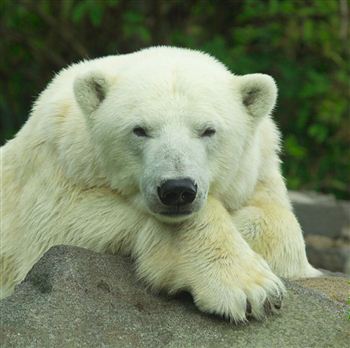
By Cara Sulieman
BRITAIN’S only polar bear is getting ready to move to a new home in the Highlands after a quarter of a century living in the same place.
Mercedes has been at Edinburgh Zoo since 1984 after being rescued from Canada where she was going to be shot for venturing into a nearby town.
But later this month she is going to be moved up to the Highland Wildlife Park near Kingussie where a four acre tundra environment has been created just for her.
Although her enclosure is big enough for her needs, visitors have always been worried about the little space she has.
On her own
Mercedes was paired up with Barney when she arrived in the capital and they went on to have two cubs, To-Nuik and Ohoto, who were both moved onto other zoos.
When Barney passed away 13 years ago, Mercedes was left on her own.
But with a new state of the art enclosure now finished and awaiting her arrival, there will be plenty to distract Mercedes.
The £300,000 enclosure has been entirely funded by donations, including the help of a team of soldiers from the army who donated their time, skills and equipment to build the basic structure of the site.
“Favourite”
The remaining £75,000 was raised through appeals, and a whopping 800 people sent in money to help build Mercedes new home.
David Windmill, Chief Executive for Royal Zoological Society of Scotland, who run both the zoo and the wildlife park, said: “Mercedes has been at Edinburgh Zoo for 25 years and has been a favourite with both visitors and staff.
“I know her keepers will be sad to see her go, but the Highland Wildlife Park is a much more suitable environment for a polar bear.
“On the day of the move Mercedes will walk into her transport crate, as she has been trained to do by the keepers. She will then travel by road to the Highland Wildlife Park.
Sunday October 18
“It is difficult to say when the public will be able to see her as we’re going to give her as much time as she needs to settle in. However, we hope that people will be able to see her by the end of October.
“We realise that the departure of Mercedes will leave a void at Edinburgh Zoo and the wheels are in motion to introduce new and exciting species in the coming months.
“We will unveil these plans as soon as the details have been confirmed.”
Mercedes will be on show at the zoo until Sunday October 18 and will be moved up to the park a few days later.
Although she has been trained to walk into her crate, she won’t be forced in if she doesn’t want to and this might delay her departure.
Polar bear facts
1. Polar bears in the wild tend to live an average of 15 to 18 years, but in captivity they can live to their late 30s. The oldest known polar bear was Debby, who died last year at Winnipeg Zoo at the ripe old age of 41. Mercedes is 28.
2. Mercedes arrived in Edinburgh in 1984 aged three. Her partner Barney died in 1996 when he choked on a plastic toy cricket bat that had been dropped into the enclosure by accident.
3. Female polar bears usually have two cubs in each litter, and can usually only have five litters in their lifetime. Mercedes had one litter which produced two cubs, To-Nuik and Ohoto.
4. Mercedes is the only polar bear in captivity in the UK. Scientists estimate that there are between 20,000 and 25,000 polar bears in the wild and a further 200 in captivity around the world.
5. Polar bear fur is actually made of hollow clear hairs which look white because they reflect the sunlight. Polar bears can sleep in any position.
6. Male polar bears can grow up to 10 feet long and weigh up to 1400 pounds, with female polar bears reaching seven feet and 650 pounds.
7. Mercedes’ new Highland homes stretches to four acres and the enclosure costs £300,000, far larger than the stone built 40metre pen in Edinburgh.
8. Just 70 per cent of polar bear cubs live past their third birthday as many starve to death.
9. They eat mainly seals and are able to survive on a diet that consists entirely of blubber without getting heart disease as seal fat is naturally polyunsaturated. They have also been known to eat walrus and beluga whales.
10. Polar bears can swim at 6mph and can move at up to 25mph on land.
See more of our pictures at our Flickr site and videos at our dedicated channel, Deadline TV.